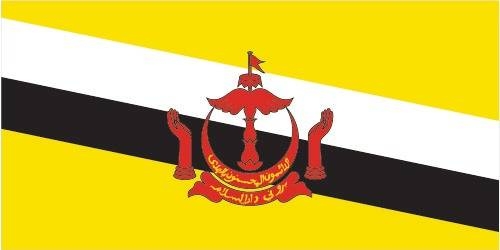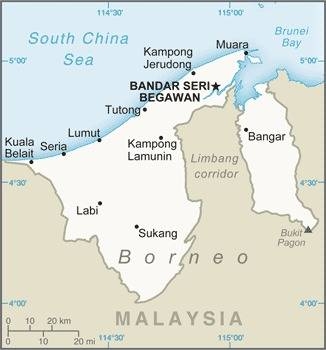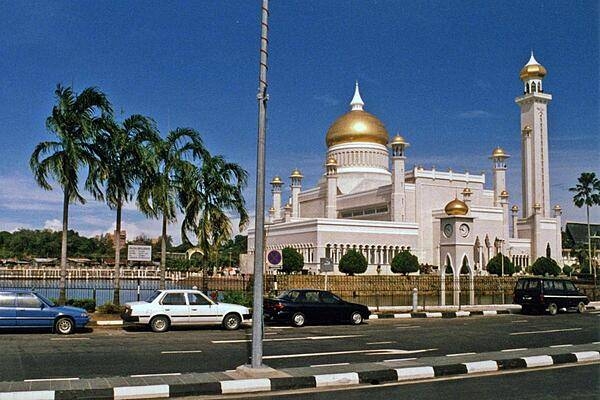132 Brunei

Yellow with two diagonal bands of white (top, almost double width) and black starting from the upper hoist side. The national emblem in red is superimposed at the center. Yellow is the color of royalty and symbolizes the sultanate. The white and black bands denote Brunei’s chief ministers. The emblem includes five main components: a swallow-tailed flag, the royal umbrella representing the monarchy, the wings of four feathers symbolizing justice, tranquility, prosperity, and peace, the two upraised hands signifying the government’s pledge to preserve and promote the welfare of the people, and the crescent moon denoting Islam, the state religion. The state motto “Always render service with God’s guidance” appears in yellow Arabic script on the crescent. A ribbon below the crescent reads “Brunei, the Abode of Peace”.
Flag courtesy of the CIA World Factbook

Map courtesy of the CIA World Factbook

The Sultan Omar Ali Saifuddin Mosque in the water village of Kampong Ayer is a major landmark and tourist attraction in Brunei. The structure was completed in 1958 in a mixture of Mughal and Italian architectural styles. Built on an artificial lagoon, the mosque is surrounded by lush gardens, fountains, and trees. Its most recognizable feature is the main dome covered in pure gold. From its marble minaret one can enjoy a panoramic view of the capital city.
Photo courtesy of the CIA World Factbook
Government
According to Britannica, in 1959 Brunei became a self-governing state and adopted a constitution, although the British retained jurisdiction over foreign policy, defense, and internal security. Limited attempts at elected representative government under this constitution were abandoned by 1970. After Brunei attained full independence in 1984, an Islamic sultanate was established, and the constitution, while retained, underwent significant amendment.
Ultimate authority rests with the sultan, who is both head of state and head of government. As prime minister, he presides over a Council of Ministers (cabinet) and is advised by several other councils (Religious, Privy, Succession, and Legislative); the members of these bodies are appointed by the sultan. In 2004 the sultan approved a number of amendments to the constitution. Although a provision for a partially elected Legislative Council was among the amendments, elections have not been held.
Brunei is divided into four daerah (districts) for local administration: Temburong in the country’s eastern segment and Belait, Brunei and Muara, and Tutong in the western segment. Each is headed by a district officer. The district officers are assisted by district councils, which are largely appointed. The daerah are subdivided further into units called mukim, each of which embraces a number of kampung (villages).
Judicial power is vested in the Supreme Court, composed of the Court of Appeal and the High Court, beneath which are the magistrates’ courts. Although the High Court is a court of first instance for more serious offenses, it also handles appeals from the magistrates’ courts. Appeals from the High Court are heard by the Court of Appeal. The final court of appeal for civil cases is the Judicial Committee of the Privy Council of London. There also are courts of Islamic law (Sharīʿah; Syariah in Malay), as interpreted through Shāfiʿī jurisprudence, that can appeal to the country’s Religious Council. When Syariah was first introduced, its jurisdiction was limited to personal or family matters (e.g., marriage). In 2014, however, Brunei began to phase in Syariah for criminal cases, with full implementation of the system on April 3, 2019.
Brunei Department of Civil Aviation
Brunei Department of Civil Aviation is the civil agency charged with the regulation of aviation services within Brunei airspace. The agency is under the Ministry of Communications.
Airspace
SkyVector – Google Maps – ADS-B Exchange
ICAO countries publish an Aeronautical Information Publication (AIP). This document is divided into three parts: General (GEN), En Route (ENR) and Aerodromes (AD). ENR 1.4 details the types of airspace classes they chose to adopt from classes A through G.
Drone Regulations
DRONE REGISTRATION APPLICATION FORM
UNMANNED AIRCRAFT REGISTRATION INSTRUCTIONS FOR COMPLETION
Unmanned Aircraft Registration Guide
Registration and Operations Guidelines for Unmanned Aircraft (UA) / Drones
Advanced Air Mobility (AAM) Regulations & Policies
None found by the author.
However, should you, the reader, happen to stumble across something to the contrary, please email the author at FISHE5CA@erau.edu and you may be mentioned in the ACKNOWLEDGEMENTS section of this book by way of thanks for contributing to this free eBook!
Advanced Air Mobility (AAM) News
None found by the author.
However, should you, the reader, happen to stumble across something to the contrary, please email the author at FISHE5CA@erau.edu and you may be mentioned in the ACKNOWLEDGEMENTS section of this book by way of thanks for contributing to this free eBook!
Short Essay Questions
Scenario-Based Question
You have been hired by a Drone Startup Company. Your boss has immediately assigned this job to you.
They need you to prepare a one-page memo detailing the legalities of using a drone to film the Mosque, pictured above.
They need you to mention any national laws and local ordinances.
They specifically want to know what airspace (insert pictures) you will be operating in and whether or not you need an airspace authorization.
Does it matter whether or not you are a citizen of the country?
Lastly, there is a bonus for you if, as you scroll through this chapter, you find any typos or broken links!
Short Essay Questions
- What are the drone categories?
- How is registration addressed?
- How is remote ID addressed?
- What are the model aircraft rules?
- What are the commercial drone rules?
- Are there waivers or exemptions to the rules? If so, for what?
- Would you share a link to an interactive airspace map?
- How is BVLOS addressed?
- How can you fly drones at night?
- How can you fly drones over people?
- Where do you find drone NOTAMs?
- What are the rules for drone maintenance?
- What are the rules for an SMS program?
- What are some unique rules not mentioned above?
- What are the C-UAS rules?
- What are the AAM rules?

